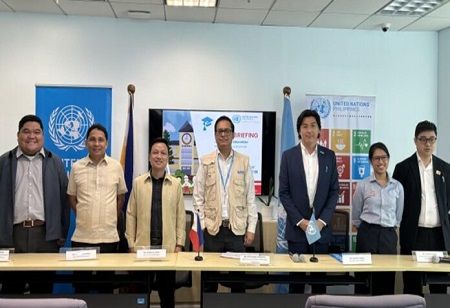- UN agencies reaffirm support for inclusive, quality education in the Philippines as millions of children, especially in vulnerable areas, still lack learning access.
- UNICEF highlights a learning crisis, with 90 percent of Grade 5 students unable to read at grade level and math skills lagging behind by two years post-pandemic.
- WFP calls for a universal school meals program, urging revision of existing laws and pledging support for sustainable financing to combat malnutrition and improve attendance.
United Nations agencies gave their complete support to the call for inclusive and quality education in the Philippines as classes began this week. During a press briefing in Makati City, UNICEF (United Nations Children's Fund) education chief Akihiro Fushimi pointed out that millions of Filipino children, who are mostly from the vulnerable and hardest to reach, are still not given access to learning opportunities and quality education.
We are here as a UN body to support the goal of the Philippine government and people to attain quality education", he explained. The reaffirmation of support is part of a week-long communications campaign of the UN Philippines in support of the back-to-school period.
UNICEF, World Food Programme (WFP), UN High Commissioner for Refugees, and UN Population Fund are represented in different regions and are assisting the Philippine government in numerous programs, such as alternative learning systems, school meals initiative, comprehensive sexuality education and refugee education, among others.
Fushimi stated that the UNICEF sees a 'big momentum' in education assistance among stakeholders of the country. He also observed that the Philippines' adoption of the K-to-12 education model was in the right direction.
"Early on, three to four years prior (to when children go to kindergarten), we need to invest in their health, nutrition and education, I believe there's tremendous momentum as far as the support is concerned, with the leadership and with the technical people's efforts on a daily basis", he added.
In the meantime, he added that the Philippines and other Southeast Asian countries are experiencing a 'learning crisis' as there is poor learning outcome among school children. Regionally, the UN executive claimed 90 percent of children in Grade 5 cannot read at the level they should be while 83 percent are having difficulties with basic mathematics.
That's a really widespread, real learning crisis and that was prior to Covid-19. In the Covid-19, the Philippines had a two-year closure of schools," he stated.
We estimate at UNICEF that kids in general in the Philippines, by Grade 4, have reading and math skills close to Grade 2 levels, already two years behind, and it is even worse in BARMM (Bangsamoro Autonomous Region in Muslim Mindanao)".
WFP deputy country director Dipayan Bhattacharyya added the problem can also be blamed on a number of factors, including poverty and malnutrition. He stated that the WFP will continue supporting the Philippines in meeting its pledges to the Global School Meals Coalition, including achieving universal coverage of school meals by 2030.
"If you look at how the existing school feeding program in the Philippines is structured, it targets only one aspect of malnutrition, which is wasting," he added. "We would actually opt for universal targeting instead of targeting certain children".
Bhattacharyya accepted that the use of a universal school feeding program will call for financing and promised to extend aid, including finding sustainable financial models.
One of his suggestions is the revision of Republic Act 11037 or the Masustansyang Pagkain para sa Batang Pilipino (Nutritious Food for Filipino Children) Act, which sets the framework on the use of government-sponsored feeding at schools.
“The targeting approach is basically determined by that republic act, so we are really requesting and advocating the government to really revisit this and amend it so that we can really move gradually towards universal school feeding program”, he said.
“We are happy to work with the government in terms of looking at different kind of financing models sustainably”, he added.

